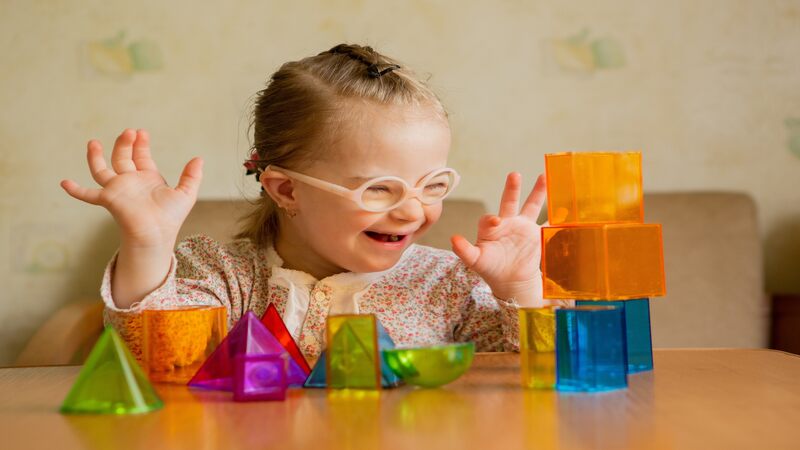
It can be quite challenging for any parent to receive the diagnosis of a genetic disorder in their child. Down Syndrome is a prevalent genetic condition that requires considerable patience when raising your little one. Parenting a toddler with Down Syndrome comes with its own set of challenges. But with right information and guidance, one can navigate it with ease.
If you have a toddler who has Down Syndrome, then this article is for you! Read on to learn about this disorder and what all you can do as a parent to help your kid lead a fulfilling life.
What is Down Syndrome?

It is a genetic condition where a kid is born with an extra copy of chromosome 21 (1). This makes them carry 47 chromosomes instead of 46. This extra chromosome causes developmental delays and a few medical abnormalities. With the help of supportive care, these kids can lead a normal life. And, with the right set of information parenting a toddler with Down Syndrome can become easy.
What Causes Down Syndrome?
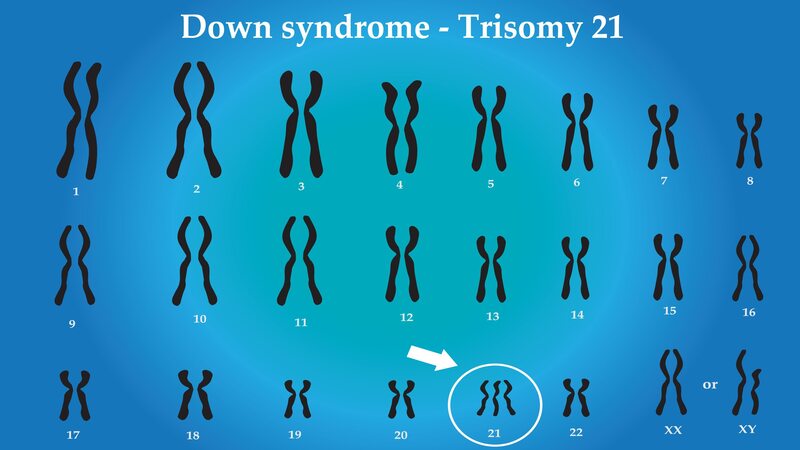
Human beings carry 23 pairs of chromosomes, where one chromosome from each pair comes from the mother and father, respectively (2). In the case of Down Syndrome, there is an extra copy of all or a part of the 21st chromosome. This extra chromosome is a result of nondisjunction during cell division (3). The exact cause of this error in cell division is not known, but many studies believe that it happens due to advancing maternal age (4).
Who Does Down Syndrome Affect?

Down Syndrome can affect kids of any race or ethnicity. It occurs in almost 1 out of 700 babies born in the United States (5). This condition is not hereditary in most cases, so it does not run in families. Many believe that the risk increases with increasing maternal age, usually after the age of 35, but can affect the babies of younger mothers too (6).
How Common is Down Syndrome?
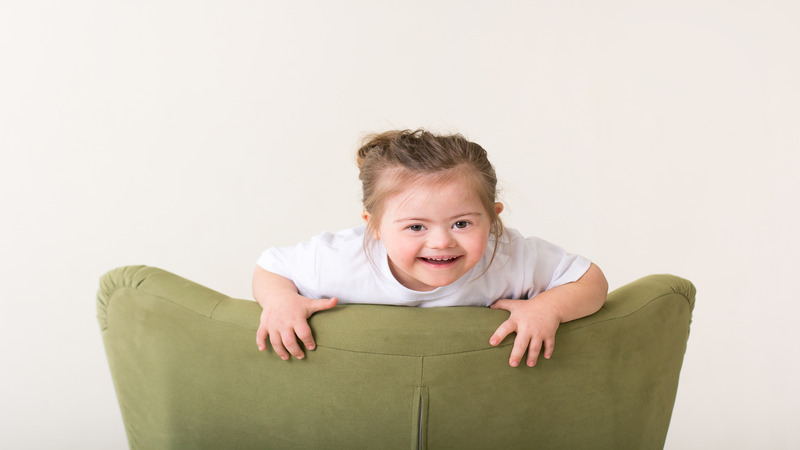
According to statistics, Down Syndrome occurs in almost 1 in 1000 live births worldwide (7). Though, the prevalence varies from place to place. It is the most common chromosomal disorder in the USA (8). According to the United Nations, approximately 3000-5000 kids are born with Down Syndrome each year (9). So, if you are someone whose kid is suffering from this genetic disorder, please be rest assured that you are not the only one parenting a toddler with Down Syndrome. It is more common than you may think!
How Can Down Syndrome Affect Your Toddler?
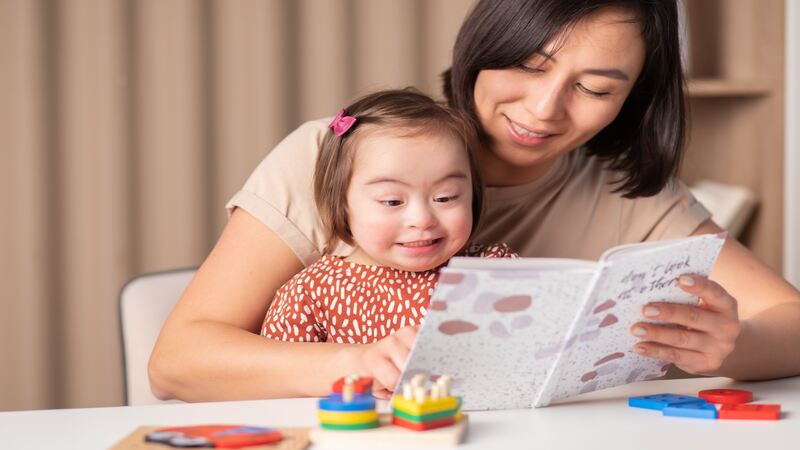
This disorder affects the learning ability of toddlers along with mild to moderate intellectual impairment. It can impact their physical development along with speech delays, delays in motor skills and cognitive function like difficulty in focusing and planning tasks. So, be prepared for these developmental delays while parenting a toddler with Down Syndrome.
Symptoms of Down Syndrome

There are various physical, behavioral and cognitive symptoms associated with Down Syndrome and the symptoms vary from kid to kid. The usual signs can be characterized as:
Physical Signs
These are mostly present since birth and become more prominent as the toddler grows. They are:
- A flat facial profile with a flat nasal bridge (10)
- Slanted eyes pointing upwards
- Tongues tend to stick out of the mouth
- Short neck
- Small ears and digits of hands and feet
- Weak muscle tone and loose joints (11)
- Only one crease in the palm (12)
- Short height
- A small pinky finger that points in
Cognitive Symptoms
- Delayed learning and problem-solving skills as compared to toddlers of the same age
- Speech delays (13)
- Delayed gross and fine motor skills, like late walking (14)
- Struggle with short-term and long-term memory (15)
Behavioral Symptoms
- Shorter attention span with difficulty focusing on a task (16)
- Throws tantrums most of the time
- Stubbornness
- Impulsive behavior at times
- Obsessive or compulsive behavior
Medical Problems That Can Happen With Down Syndrome
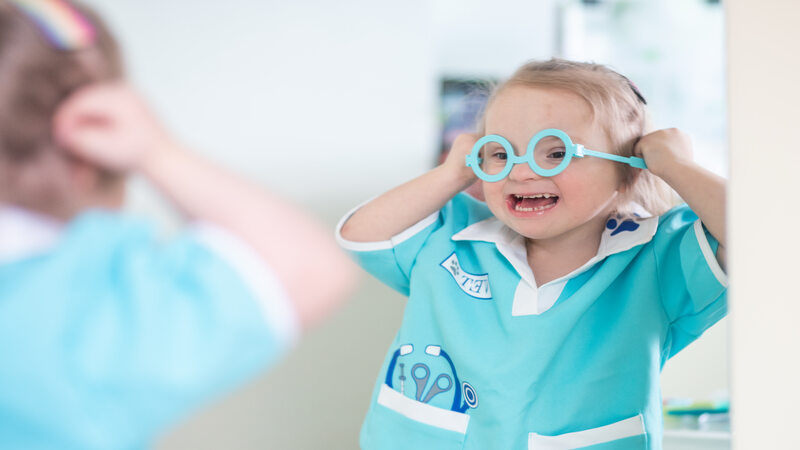
Many times, toddlers with this condition face a lot of medical issues, like:
- Hearing And Vision Issues – A number of kids visit clinics with complaints of hearing disabilities and problems with their vision like cataracts and strabismus (17).
- Heart Defects- Many toddlers are born with congenital heart defects like ventricular septal defects (VSD), or atrioventricular septal defect (18).
- Respiratory Issues – These kids are more susceptible to repeated episodes of respiratory tract infections and sleep apnea.
- Gastrointestinal Issues – A number of toddlers complain of chronic constipation, reflux and intestinal blockages due to weak muscle tone.
- Thyroid Conditions – Hypothyroidism is quite common in toddlers suffering with this condition (19).
- Leukemia – These toddlers are more likely to develop leukemia as compared to other kids of the same age (20).
- Ear infections- They have repeated episodes of ear infections due to narrow eustachian tubes.
- Skin Issues – Many kids complain of dry skin, leading to atopic dermatitis and eczema.
- Immune Disorders – Increased risks of developing autoimmune disorders.
- Dementia- Kids with this condition have greater chances of developing Alzheimer’s disease later in their lives (21).
How is Down Syndrome Diagnosed?
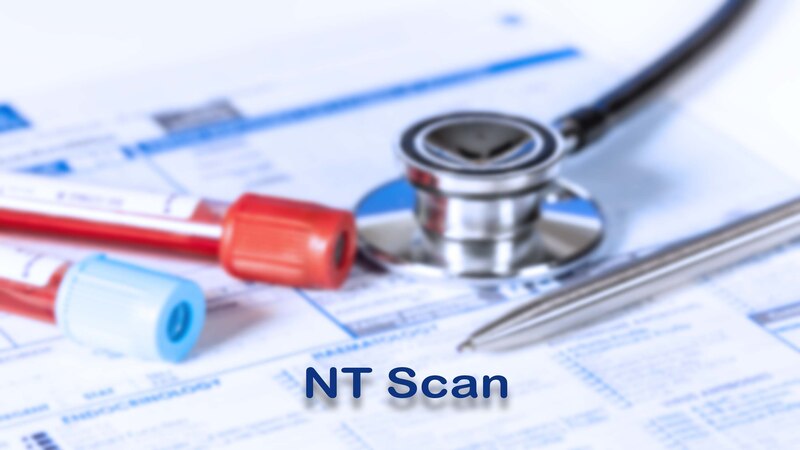
It can be diagnosed before pregnancy or after a kid is born. The two prenatal tests are as follows:
- Prenatal Screening Tests – The American College of Obstetricians and Gynecologists (ACOG) recommends screening all pregnant women for Down Syndrome (22). It involves the detection of a few markers in the blood and an ultrasound to check for nuchal translucency thickness. The nuchal translucency scan, otherwise commonly called the NT scan, is a routine ultrasound performed to evaluate the risk of the developing fetus of having Down syndrome.
- Prenatal Diagnostic Test- They involve the removal of genetic material from the placenta and tests for the extra chromosome. Most often, Chorionic Villus sampling is done.
Diagnosis After Birth
Most often, physical features after birth can suggest the possibility of Down Syndrome in a toddler. To confirm it, doctors suggest getting a chromosomal karyotype. This test uses blood samples to analyze the kid’s chromosomes. A set of three chromosomes instead of a pair on the 21st position confirms this disorder.
Is Down Syndrome Treatable?

There is no specific treatment for this disorder, as it is difficult to reverse a chromosomal abnormality (23). However, a number of interventions and supportive therapies can help improve the quality of life. The earlier the support is given, the better it will be for the toddler. Studies show that early interventions definitely improve outcomes (24). Therapies can help a little one reach delayed milestones. So, if you are parenting a toddler with Down Syndrome, then it is essential that you get in touch with your doctor to start therapies as early as possible. The different therapies include:
- Physical And Occupational Therapy – A toddler with Down Syndrome can benefit from physical therapy as it will help them sit and walk properly. In occupational therapy, they will learn everyday skills like how to eat, dress up and use various day-to-day things.
- Speech Therapy – Toddlers with delayed speech can benefit from a speech therapist.
- Emotional And Behavioral Therapy – Here, a counselor or a mental health professional helps a kid with Down Syndrome deal with emotions. Difficulty in communication can lead to frustration and compulsive behavior, which can get better with behavioral therapy.
- Educational Support – Specially tailored learning programs can help toddlers with suffering from this disorder academically and socially.
- Medical Care – Kids with Down Syndrome often deal with a lot of medical issues that require regular check-ups and medical assistance. Monitoring is required in cases of heart defects and hearing and vision disabilities.
What to Expect if Your Toddler Has Down Syndrome?
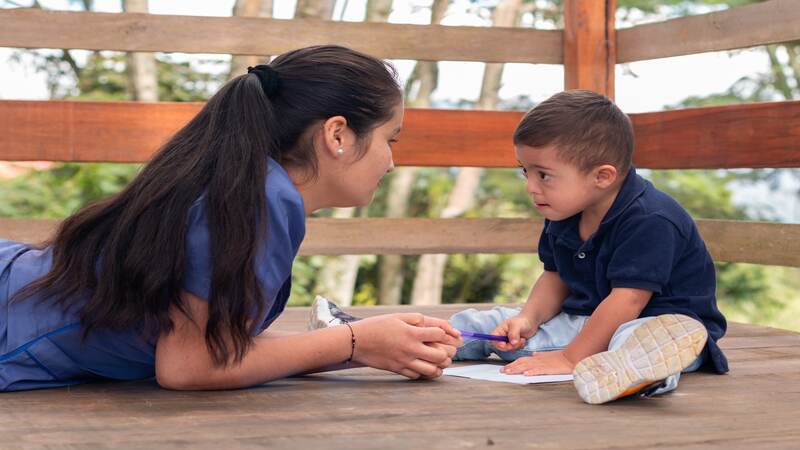
As every toddler is different from each other, toddlers with this condition also vary from each other. There are several aspects that you will come across while parenting a toddler with Down Syndrome. You can expect the following:
- Delayed Developmental Milestones – Kids with Down Syndrome reach their milestones a bit later than their peers, like walking, speaking etc.
- Cognitive Development – There can be a mild to moderate intellectual disability in your toddler with Down Syndrome.
- Medical Concerns – A toddler suffering with this disorder will be at higher risk of medical issues like congenital heart defects, hearing and vision issues, etc.
What Can Parents do if Their Kid Has Down Syndrome?

Raising a toddler with Down Syndrome can be challenging, but there is a lot that you can do in order to support them in leading a normal life. Seeking early interventions like speech, occupational, and physical therapies can help with overall development. You can also work with specialized educators to tailor an Individualized Education Plan (IEP) that will cater to your toddler’s needs (25).
There are many support groups and organizations that work for kids with this genetic disorder. They provide good opportunities and emotional support for the family.
Most importantly, as a parent you need to have a positive environment at home that can nurture their personal growth and confidence. You need to identify your toddler’s interests and strengths and help them work on them. Your encouragement can really work wonders.
A toddler diagnosed with Down Syndrome can lead a normal life with your love, support, and early intervention. Regular visits to the pediatrician will ensure timely screening and management of all possible medical concerns. With understanding, care, and patience, parenting a toddler with Down Syndrome can be navigated with ease.
FAQ’s
1. Can a Down Syndrome Child Live a Normal Life?
Yes, a child with Down syndrome can lead a normal life, provided they get good supportive care and early interventions. With an Individualized Education Plan and positive encouragement from family, a path to a meaningful life can be paved.
2. How Does a Child With Down Syndrome Behave?
There are certain behavioral issues linked with children with this disorder. Due to problems in communication skills, they can show signs of stubbornness, obsessive and compulsive behavior and impulsivity.
3. Can a Child With Down Syndrome Talk?
There can be delays in speech for a child with Down Syndrome, as compared to kids of the same age. This can be made better with the use of speech therapies.
4. Can a Child Have Down Syndrome And Look Normal?
There are characteristic physical features associated with this condition. These features vary from child to child. Some children have almost all of them while a few of them look more like their normal family members.
5. What Parent Gives a Child Down Syndrome?
It occurs due to a random genetic error during the formation of sperm and ova. It has nothing to do with parents. However, a few studies show that the advanced age of one or both parents can increase the chances.
6. When do Kids With Down Syndrome Start Walking?
Kids with Down Syndrome often start walking later than their peers. On an average, they start walking between 15-24 months of age.
7. How Smart Are Kids With Down Syndrome?
Kids with Down Syndrome often have mild to moderate intellectual and cognitive disabilities. With the help of early interventions, this hurdle can be overcome.
8. Is Down Syndrome a Disability?
Yes, it is a disability associated with developmental delays and intellectual disabilities. But, kids with Down Syndrome can lead a normal life with good support despite the challenges.
9. Do Kids With Down Syndrome Remember?
There are studies that show that kids with Down syndrome often have short-term memory impairments. Though, most children have the ability to remember and retain information.
10. At What Age is Down Syndrome Noticeable?
The physical features associated with Down Syndrome are often visible since birth. Some physical features and developmental delays become more noticeable as the kid grows.
11. Who is a Famous Person With Down Syndrome?
Chris Burke and Tommy Jessop are famous actors with Down Syndrome.
References
- Maj A Hultén, Suketu D Patel, Maira Tankimanova, Magnus Westgren, Nikos Papadogiannakis, Anna Maria Jonsson & Erik Iwarsson – https://link.springer.com/article/10.1186/1755-8166-1-21
- Medlineplus – https://medlineplus.gov/ency/article/002327.htm
- Eunice Kennedy Shriver National Institute of Child Health and Human Development (NICHD) – https://www.nichd.nih.gov/health/topics/down/conditioninfo/causes
- Herbert M, Kalleas D, Cooney D, Lamb M, Lister L. Meiosis and maternal aging: insights from aneuploid oocytes and trisomy births. Cold Spring Harb Perspect Biol. 2015 Apr 1;7(4):a017970. doi: 10.1101/cshperspect.a017970. PMID: 25833844; PMCID: PMC4382745. – https://www.ncbi.nlm.nih.gov/pmc/articles/PMC4382745/
- Minnesota Department of Health – https://www.health.state.mn.us/diseases/cy/downsyndrome.html
- Wayne W. LaMorte, MD, PhD, MPH, Boston University School of Public Health – https://sphweb.bumc.bu.edu/otlt/MPH-Modules/PH717-QuantCore/PH717-Module11-Confounding-EMM/PH717-Module11-Confounding-EMM3.html
- Akhtar F, Bokhari SRA. Down Syndrome. [Updated 2023 Aug 8]. In: StatPearls [Internet]. Treasure Island (FL): StatPearls Publishing; 2024 Jan – https://www.ncbi.nlm.nih.gov/books/NBK526016/
- National Down Syndrome Society (NDSS) – https://ndss.org/about
- United Nations – https://www.un.org/en/observances/down-syndrome-day
- Medically Reviewed by Sabrina Felson, MD on July 16, 2023 Written by WebMD Editorial Contributors – https://www.webmd.com/a-to-z-guides/what-is-a-low-nasal-bridge
- Physiopedia – https://www.physio-pedia.com/Musculoskeletal_Effects_Of_Down_Syndrome
- Medlineplus – https://medlineplus.gov/ency/imagepages/17226.htm
- Buckley, S. (1993) Language development in children with Down syndrome – Reasons for optimism. Down Syndrome Research and Practice, 1(1), 3-9. doi:10.3104/reviews.5 – https://www.down-syndrome.org/en-us/library/research-practice/01/1/language-development-down-syndrome-reasons-optimism/
- Malak R, Kostiukow A, Krawczyk-Wasielewska A, Mojs E, Samborski W. Delays in Motor Development in Children with Down Syndrome. Med Sci Monit. 2015 Jul 1;21:1904-10. doi: 10.12659/MSM.893377. PMID: 26132100; PMCID: PMC4500597. – https://www.ncbi.nlm.nih.gov/pmc/articles/PMC4500597/
- Jarrold, C, and Baddeley, A. (2001) Short-term memory in Down syndrome: Applying the working memory model. Down Syndrome Research and Practice, 7(1), 17-23. doi:10.3104/reviews.110 – https://www.down-syndrome.org/en-us/library/research-practice/07/1/short-term-memory-down-syndrome-applying-working-memory-model/
- Dianne M. McBrien, MD, Assistant Professor of Pediatrics, First published: 1998, Last Revised: January 2012, Peer Review Status: Internally Peer Reviewed – https://uihc.org/childrens/health-topics/attention-problems-down-syndrome-adhd
- Visual Symptoms Treatment Center – https://www.visualsymptomstreatmentcenter.com/eye-care-services/vision-therapy-optometrist/down-syndrome-and-vision/
- National Down Syndrome Society (NDSS) – https://ndss.org/resources/the-heart-down-syndrome
- Amr NH. Thyroid Disorders in Subjects with Down Syndrome: An Update. Acta Biomed. 2018 Mar 27;89(1):132-139. doi: 10.23750/abm.v89i1.7120. PMID: 29633736; PMCID: PMC6357620. – https://www.ncbi.nlm.nih.gov/pmc/articles/PMC6357620/
- Leukaemia Care – https://www.leukaemiacare.org.uk/support-and-information/latest-from-leukaemia-care/blog/the-link-between-downs-syndrome-and-leukaemia/
- Salehi A, Ashford JW, Mufson EJ. The Link between Alzheimer’s Disease and Down Syndrome. A Historical Perspective. Curr Alzheimer Res. 2016;13(1):2-6. doi: 10.2174/1567205012999151021102914. PMID: 26487155; PMCID: PMC6368451. – https://www.ncbi.nlm.nih.gov/pmc/articles/PMC6368451/
- Eunice Kennedy Shriver National Institute of Child Health and Human Development (NICHD) – https://www.nichd.nih.gov/health/topics/down/conditioninfo/diagnosis
- Stanford Medicine Children’s Health – https://www.stanfordchildrens.org/en/topic/default?id=down-syndrome-trisomy-21-in-children-90-P02356
- Proofread by: Mateusz Brodowicz, Published: July 9, 2024 – https://aithor.com/essay-examples/the-impact-of-early-intervention-on-the-development-and-quality-of-life-of-individuals-with-down-syndrome
- Maya Riser-Kositsky, December 17, 2019 – https://www.edweek.org/teaching-learning/what-is-an-iep-individualized-education-programs-explained/2023/07
